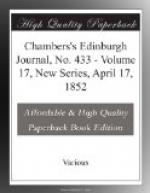A new era had now commenced. It had been proved to a demonstration, that the mandarins were common mortals, and that the great emperor did not sway the whole world. Democratic assemblies rose in every part of the land; the people must be consulted where their happiness was concerned; the citizens and peasants turned politicians; and if in any case remonstrance failed, they proceeded, en masse, to the government offices, and carried by force what was denied to courtesy. The emperor learning these movements, instantly took the popular side; laid all the blame on the mandarins, and superseded those who had given offence. The taxes which had been refused, he remitted as an act of sovereign favour; and the laws were relaxed—often to the injury of well-disposed citizens. The people were again and again termed the dear children of the emperor, and every member of the cabinet found his best interest in advocating popular measures.
The rest of Taou-Kwang’s reign was spent chiefly in endeavours to improve his naval and military forces, and in fruitless struggles to replenish the exhausted treasury of the state. His own, meanwhile, was full to overflowing, having received immense accessions from the confiscated property of his unsuccessful generals and degraded ministers. He died on the 25th of February 1850, aged sixty-nine. In his will, there appears the following notice of the English war: ’The little fools beyond the Western Ocean were chastised and quelled by our troops, and peace was soon made; but we presumed not to vaunt our martial powers.’
FOOTNOTES:
[1] London: Smith, Elder, & Co.: 1852.
A GLIMPSE OF BALLYVOURNEY.
Among the various plans that have been suggested for ameliorating the condition of Ireland, and improving the moral and social status of her people, I know of few better calculated to produce these beneficial results than that of opening good lines of road through wild and uncultivated districts, and by this means facilitating the intercourse between the inhabitants of almost unknown regions and those of more advanced and enlightened districts. Where this has been done, in conjunction with other local improvements, a moral regeneration has taken place that could scarcely be credited by those who have not witnessed the effect. In proof of what I say, I will endeavour to give a short account of a journey I made last summer from Cork to the far-famed Lakes of Killarney. I had performed the same journey several years before; but I now travelled, after passing Macroom, by a road that had been made since my last visit, through Ballyvourney, a wild and mountainous district, formerly impassable. The territorial improvements there are now matter of history, it having been proved before the Commissioners of Land Inquiry, that land, valued at 3s. 9d. per acre, had been made permanently worth L.4 per acre by a small outlay, which, with all expenses, rent, and interest of money, was repaid in three years.




